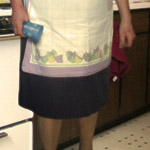 Dangers abound for the insouciant child, but by far the most treacherous waters to navigate are those of socialization. The survival of one’s formative years is largely dependent upon the learning of arbitrary rules hatched by adults. Even so, where matters of protocol were concerned, I excelled. I rather enjoyed the code of it. I was a quiet child, detail-minded, generally thoughtful, and courteous to a fault. My single downfall, if it could be so called, was that I didn’t like to use peoples’ names.
Dangers abound for the insouciant child, but by far the most treacherous waters to navigate are those of socialization. The survival of one’s formative years is largely dependent upon the learning of arbitrary rules hatched by adults. Even so, where matters of protocol were concerned, I excelled. I rather enjoyed the code of it. I was a quiet child, detail-minded, generally thoughtful, and courteous to a fault. My single downfall, if it could be so called, was that I didn’t like to use peoples’ names.
It’s not something I had never articulated, and no one had ever commented on it to me. But in fact my entire childhood was geared toward determining how to meet my needs without using anyone’s name. These aren’t conscious decisions one comes to, but innate inclinations one happens upon in the course of self realization.
For two years I was able to get by without saying my babysitter’s name. Whenever one of the other kids asked her for something, I could simply attach a “Me too, please!” to the request, and I’d be in. My technique was transparent, and all the more compelling for the “please,” at the end. The “please” is the bane of most kids’ existence. Every book on etiquette obsesses over the necessity of the “please.” And why not? It is, after all, the most important bit. Luckily for me, that word never presented a problem. I savored it, in fact, and the word dropped from my lips like silk.
One of life’s lessons that always comes too late is that avoidance only makes the inevitable worse. I’m not sure how it happened, but something was stuck in my babysitter’s craw the day she made me learn it. I recall running into the kitchen from the heat of a summer afternoon with one of the other children. I always took particular care not to let the screen door slam shut, so thoughtful was I. “Mrs. Dutrow, can I have a glass of kool aid?” asked Mark.
“Me too, please!” I said.
My babysitter retrieved a single plastic cup from the shelf, filled it with cool sugar water, handed it to my colleague, and then regarded me cooly. “Say my name,” she said to me.
My friend took this as his cue to exit, while I stood rooted to my spot on the worn kitchen linoleum. “What?” was all I could muster. There’s nothing like running headlong into an invisible barrier that leaves you questioning your most basic assumptions. What had just happened? I ran the scene through in my head again, but I couldn’t find anything out of place. Sure, there was the tug of guilt because I knew exactly what I’d been getting away with. Yet I couldn’t believe that she would actually confront me about my disinclination to call people by their names. It seemed an outright violation, if not a cheap grab for control.
“You never say my name,” she said. “You never say anyone’s name.” And there it was, the ugly truth. She might as well have said, “You’re short and slightly cross-eyed,” but that would have been stating the obvious at least. This was different. Like that she had just laid out my secret. Fifteen other children under her daily care, and she didn’t care in the least that any one of them might have overheard.
Continue reading →
 My friend returned from her vacation with skin the color of apricot honey. “Wow,” I said, and proceeded to ignore her recounting of exotic locales and leisure pursuits. The change in her complexion was profound, but more than that, her countenance glowed with a vitality that made her seem more real. She was transformed, and I couldn’t help but to comment again. “I can’t get over how healthy you look. I guess that’s it.”
My friend returned from her vacation with skin the color of apricot honey. “Wow,” I said, and proceeded to ignore her recounting of exotic locales and leisure pursuits. The change in her complexion was profound, but more than that, her countenance glowed with a vitality that made her seem more real. She was transformed, and I couldn’t help but to comment again. “I can’t get over how healthy you look. I guess that’s it.”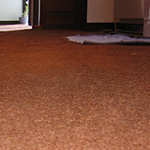 I’m lying on the floor, languid as a corpse. I practice not breathing, and can feel my heart slowing. Slowing. Then I feel the need to stretch, and I stretch so violently that my molars click against each other like one of those wind-up dentures. The feeling of unmitigated sloth is delicious. I’ve always enjoyed a good stretch on the floor. It’s convenient, it’s flat, and the low viewpoint provides a most favorable perspective of a room. As a matter of personal aesthetic, I’ve preferred an inferior perspective since I was quite young. My adolescent height gains only made me more conspicuous, and allowed me to see over everything at will. Where’s the adventure in that? When one is small, everything is a potential maze, which is one reason why, every now and again, I appreciate a return to a more grounded point of view.
I’m lying on the floor, languid as a corpse. I practice not breathing, and can feel my heart slowing. Slowing. Then I feel the need to stretch, and I stretch so violently that my molars click against each other like one of those wind-up dentures. The feeling of unmitigated sloth is delicious. I’ve always enjoyed a good stretch on the floor. It’s convenient, it’s flat, and the low viewpoint provides a most favorable perspective of a room. As a matter of personal aesthetic, I’ve preferred an inferior perspective since I was quite young. My adolescent height gains only made me more conspicuous, and allowed me to see over everything at will. Where’s the adventure in that? When one is small, everything is a potential maze, which is one reason why, every now and again, I appreciate a return to a more grounded point of view. Dangers abound for the insouciant child, but by far the most treacherous waters to navigate are those of socialization. The survival of one’s formative years is largely dependent upon the learning of arbitrary rules hatched by adults. Even so, where matters of protocol were concerned, I excelled. I rather enjoyed the code of it. I was a quiet child, detail-minded, generally thoughtful, and courteous to a fault. My single downfall, if it could be so called, was that I didn’t like to use peoples’ names.
Dangers abound for the insouciant child, but by far the most treacherous waters to navigate are those of socialization. The survival of one’s formative years is largely dependent upon the learning of arbitrary rules hatched by adults. Even so, where matters of protocol were concerned, I excelled. I rather enjoyed the code of it. I was a quiet child, detail-minded, generally thoughtful, and courteous to a fault. My single downfall, if it could be so called, was that I didn’t like to use peoples’ names.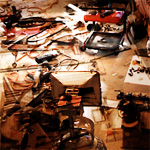 My office used to be a place where I would hide in fear as the besuited folk plowed their cubicle crops. But now my office resembles the aftermath of a freak industrial accident, and as I lay draped over my designer chair my superiors fall over themselves to praise my good work. It’s no accident that papers are strewn across every available horizontal surface, or that my desk is festooned with dozens of writing instruments, redundant office appliances, and stray pieces from things that I didn’t know what they were to begin with. The fact is that the cleanliness of my office is inversely proportional to my standing at the company, and right now I’m a superstar.
My office used to be a place where I would hide in fear as the besuited folk plowed their cubicle crops. But now my office resembles the aftermath of a freak industrial accident, and as I lay draped over my designer chair my superiors fall over themselves to praise my good work. It’s no accident that papers are strewn across every available horizontal surface, or that my desk is festooned with dozens of writing instruments, redundant office appliances, and stray pieces from things that I didn’t know what they were to begin with. The fact is that the cleanliness of my office is inversely proportional to my standing at the company, and right now I’m a superstar.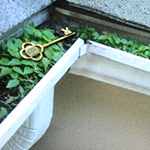 Owing to severe lack of focus I tend to lose anything that isn’t part of my actual body. I tell the ladies that I just have a canny asceticism, but it’s hard for me to maintain an air of wisdom when I’m locked outside my own house four times a week because I can’t remember where I put my key. This is why I keep a spare house key up in the rain gutter. The house is one of those modern designs, made primarily out of a single slab of some foamcrete-like material, so I suppose I could just walk through one of the walls if I pushed firmly enough. In any case, because it’s a slab structure there are no convenient crooks or crannies in which one might conceal a spare key, which is why I’ve taken to hiding it up in the rain gutter.
Owing to severe lack of focus I tend to lose anything that isn’t part of my actual body. I tell the ladies that I just have a canny asceticism, but it’s hard for me to maintain an air of wisdom when I’m locked outside my own house four times a week because I can’t remember where I put my key. This is why I keep a spare house key up in the rain gutter. The house is one of those modern designs, made primarily out of a single slab of some foamcrete-like material, so I suppose I could just walk through one of the walls if I pushed firmly enough. In any case, because it’s a slab structure there are no convenient crooks or crannies in which one might conceal a spare key, which is why I’ve taken to hiding it up in the rain gutter. At a family reunion dinner, my great grandfather–a man who was, to me, as noble as a silverback gorilla–ground his molars mercilessly. Our relationship at the time was such that he would occasionally drop tidbits of age-old wisdom on me, and I would not let on that my pockets were stuffed full of colorful summer beetles that I had collected from his garden. It’s fair to say that we weren’t exactly on the same wavelength. But as inscrutable as the old man was, when it came down to such basics as the feeding process, any mystique he’d cultivated just went out the window. Whether he was processing steak gristle or apple sauce, I endured the sound of rhythmic pulverization for the length of the dinner. It seemed impossible that this had been going on for eight decades. No, more likely he had simply reached a point where he knew just how long he needed to last, so why not use it up? To end on zero, there’s nobility in that, surely.
At a family reunion dinner, my great grandfather–a man who was, to me, as noble as a silverback gorilla–ground his molars mercilessly. Our relationship at the time was such that he would occasionally drop tidbits of age-old wisdom on me, and I would not let on that my pockets were stuffed full of colorful summer beetles that I had collected from his garden. It’s fair to say that we weren’t exactly on the same wavelength. But as inscrutable as the old man was, when it came down to such basics as the feeding process, any mystique he’d cultivated just went out the window. Whether he was processing steak gristle or apple sauce, I endured the sound of rhythmic pulverization for the length of the dinner. It seemed impossible that this had been going on for eight decades. No, more likely he had simply reached a point where he knew just how long he needed to last, so why not use it up? To end on zero, there’s nobility in that, surely. A red sign on the door can’t be a good thing, can it? But we’re a block away, and though I can’t yet read the single word emblazoned on it, hope drains with each step. And indeed, the truck rental place is closed by the time we’re pressing our foreheads against the glass door. As a result of this we’re not just inconvenienced or put out, but well and truly fucked. These are the situations that nightmares are made of, because now we’ll basically have to rely on the moped we rode in on to move all the furniture–by midnight–which is more than patently absurd. So I should be devastated. I am devastated. But secretly I’m also reveling in it. Not in a way that I would dare put to words, especially not then and there. But there’s no denying that there’s a part of me that relishes the sweet kiss of denial.
A red sign on the door can’t be a good thing, can it? But we’re a block away, and though I can’t yet read the single word emblazoned on it, hope drains with each step. And indeed, the truck rental place is closed by the time we’re pressing our foreheads against the glass door. As a result of this we’re not just inconvenienced or put out, but well and truly fucked. These are the situations that nightmares are made of, because now we’ll basically have to rely on the moped we rode in on to move all the furniture–by midnight–which is more than patently absurd. So I should be devastated. I am devastated. But secretly I’m also reveling in it. Not in a way that I would dare put to words, especially not then and there. But there’s no denying that there’s a part of me that relishes the sweet kiss of denial.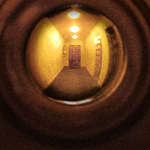 “You’re shy, aren’t ya?” Michelle asked, her chair squeaking as she leaned it forward on two spindly legs. I thought I heard her tongue falter on “aren’t,” like she was translating from the twang of her native “ain’t.” She asked the question in earnest though, and it wrinkled her brow.
“You’re shy, aren’t ya?” Michelle asked, her chair squeaking as she leaned it forward on two spindly legs. I thought I heard her tongue falter on “aren’t,” like she was translating from the twang of her native “ain’t.” She asked the question in earnest though, and it wrinkled her brow. Damned if my hands didn’t look good around Claire’s throat. But then, my inability to perceive an act so visceral with any subjectivity was the very reason I was finally giving my agent the throttling she deserved. It sent me into a rage that there was a part of my mind, even then, that wasn’t focused entirely on squeezing with every ounce of strength I could muster. I could just hear the photographer’s direction: “Now lace your fingers behind back there, and turn the hero head just a little so we can see your thumbs. Nice!”
Damned if my hands didn’t look good around Claire’s throat. But then, my inability to perceive an act so visceral with any subjectivity was the very reason I was finally giving my agent the throttling she deserved. It sent me into a rage that there was a part of my mind, even then, that wasn’t focused entirely on squeezing with every ounce of strength I could muster. I could just hear the photographer’s direction: “Now lace your fingers behind back there, and turn the hero head just a little so we can see your thumbs. Nice!” I met Tasha late last year at the rec center pool. I was doing my usual laps, and forcing myself to remain submerged as long as I could bear it. When I surfaced at the pool’s edge, her ankles were the first things I saw. Tasha stood there with a look I could only interpret as expectation, like she was close to remembering me from somewhere else, and only hoped that I would make it easier by remembering first. I could only shrug. “Sorry?” I said.
I met Tasha late last year at the rec center pool. I was doing my usual laps, and forcing myself to remain submerged as long as I could bear it. When I surfaced at the pool’s edge, her ankles were the first things I saw. Tasha stood there with a look I could only interpret as expectation, like she was close to remembering me from somewhere else, and only hoped that I would make it easier by remembering first. I could only shrug. “Sorry?” I said.